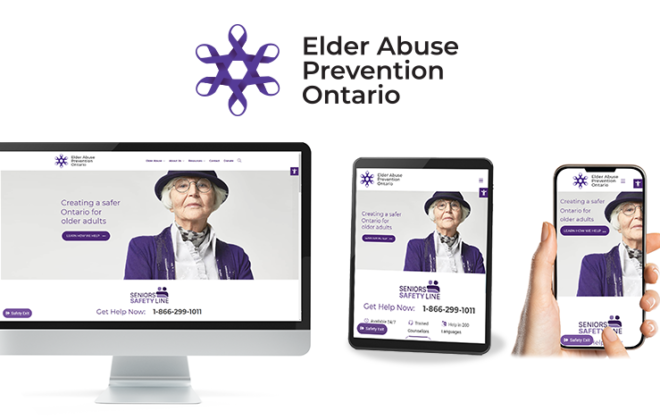Mental Health Week: May 1-7, 2023
Join EAPO through May 1-7, 2023 as we recognize Mental Health Week. This year’s theme is #MyStory. EAPO continues to listen to and support seniors going through difficult times of abuse. Be there for each other when times are hard and be ready to listen.
How to get mental health help
Some people worry about asking for help because there can be stigma around mental health problems. They may believe that asking for help means admitting that something is wrong. Some people worry about how others might see them. Asking for help means that you want to make changes or take steps towards your new health goals. We should celebrate the courage it takes to speak up and make changes. Getting help is part of recovery.
Recovery can mean many different things. Some people see recovery as going back to their daily life before signs of a health problem. Other people see recovery as learning to live well, contributing to a community, and building relationships despite the challenge of a health problem. Recovery is a process or journey rather than a single end goal. A support team can help you on your way—no one should ever have to follow their journey entirely on their own. A team of carers and supports can guide you, provide help and assistance, celebrate your victories, and back you up when you need it.
Building your team
The first steps may be the toughest, but knowing where to look for help is a good start. Here are good places to begin building your team:
- Talk with supportive friends and family. Share your feelings with them and let them be part of your team.
- Talk to your family doctor. They are a great resource and can link you to other professionals, if needed.
- Connect with community mental health clinics or organizations like the Canadian Mental Health Association (CMHA) for information, support, and services.
- Call a help line. Some organizations also offer support online or through text messaging.
- Learn more about mental health. You can find useful books, websites, and other resources through your provincial or territorial government and community agencies.
- Connect with others who have personal experience with a mental illness and learn more about their recovery journey.
- Attend workshops and education sessions hosted at community centres, agencies, schools, colleges or universities.
- Talk with a member or leader you trust from your faith or cultural group.
Members of the team
The exact people on your support team will depend on your situation and your goals, but most teams include some combination of the following people.
Family doctor
Your family doctor will assess your needs, rule out other causes, work with you to plan a course of action, support you in selecting other team members, and monitor progress. Some service providers, like psychiatrists, can only be accessed through a family doctor. This process is called a referral.
Psychiatrist
A psychiatrist is a medical doctor with a specialty in the diagnosis and treatment of mental illnesses. They can prescribe medication and use counselling to support recovery. You usually need a referral from your family doctor to see a psychiatrist. Psychiatrists’ fees are covered by provincial and territorial health plans.
Psychologist
Psychologists are trained to assess, diagnose and treat mental health problems and disorders. They hold a masters or doctoral degree in psychology and usually within a specific specialty area or areas like clinical psychology or clinical neuropsychology. A psychologist cannot prescribe medications. Their expertise includes psychological testing and assessment of emotional and cognitive functions, the diagnosis of emotional and cognitive disorders and the use of evidence-based psychological treatments and psychotherapies. When a psychologist is employed by a public institution like a hospital, school or correctional facility, their services are covered by the public health system. When a psychologist practices in the community, however, their services are typically not covered by public health insurance plans. However, they are usually covered by an extended health insurance plan you may have through work. You can make an appointment with a psychologist in the community on your own without a doctor’s referral. To find a psychologist in your area go to www.cpa.ca/public/findingapsychologist.
Counsellors
Registered or certified counsellors (such as a Registered Professional Counsellor or Registered Clinical Counsellor) are trained to assess mental health problems and use different counselling or other methods. This often includes teaching different skills to help improve well-being. Counsellors are not medical doctors and can’t prescribe medications. You can make an appointment with a counsellor on your own—you don’t need a doctor’s referral. A counsellor’s fees are not covered under all provincial or territorial health plans. Ask your private insurance company or workplace benefits provider if they cover services provided by a counsellor.
Other mental health professionals
There are many different mental health professionals who can assist you with your recovery process and support your goals. If you’re seeing a care provider, they may suggest that you team up with other mental health professionals such as a nurse, social worker, or occupational therapist. You may also be able to access these professionals privately. Some fees may not be covered by your provincial or territorial health plan, so ask about costs and coverage when you make your appointments.
Community health organizations
Community mental health organizations, such as the Canadian Mental Health Association, can help you find resources and offer many different programs that may also be of benefit to you. To find a CMHA branch in your community, visit this page.
Support groups and peer supporters
Support groups are a safe place to share your experiences, learn from others, and connect with people who understand what you’re going through. Some support groups are formal groups led by a mental health professional, while others are more casual groups of peers. You can find support groups through members of your support team and through community health organizations.
Peer supporters are trained to provide support and understanding, help people navigate the mental health system, link people with community services, and support work towards personal goals. Peer supporters are people who have experiences of mental illness or support a loved one.
Other community services
Sometimes, we need extra help with day-to-day activities like housekeeping, meal preparation, driving to appointments or filling out forms for housing or income support. Community organizations can offer different kinds of practical support, such as meal delivery, transportation, home care, and advocacy. You can find these services through members of your support team, community organizations, and your provincial or territorial health services network. Some services have fees and some services are based on certain criteria. If you aren’t sure who to call, contact your local CMHA branch to find services in your area.
How can I help a loved one?
Loved ones can play an important role in helping someone choose the best options for their situation. You can offer both emotional support and a lot of important practical help, like scheduling appointments or finding services. You can also be key in helping monitor early changes in a loved one’s well-being, including both setbacks and improvements.
It’s important to respect your loved one’s wishes, even if you don’t agree with their choices. Forcing someone to choose a particular treatment or service provider can damage relationships and make things harder for everyone. If a loved one is an adult, they have the right to choose their own care and the right to privacy in most situations. Be aware that, in most cases, service providers have a legal obligation to protect personal treatment information. However, your loved one can let their care team share some or all of the information with you.
If you are supporting a loved one, you may also find some services helpful for you. There are support groups to help loved ones cope with challenges and connect with others, and community services like home care can offer a lot of practical help at home.
Do you need more help?
Contact a community organization like the Canadian Mental Health Association (CMHA) to learn more about support and resources in your area. Visit this page to contact CMHA in your area.
This Mental Health Week, we can harness the power of storytelling to help build connections and understanding between each other while strengthening our communities. To get involved, you can:
- Share your story and support for universal mental health care using the hashtags #MyStory and #MentalHealthWeek;
- Learn about different types of mental health supports and how they can be used to support you or someone in your community;
- Visit www.mentalhealthweek.ca for more information and to download resources;
- Donate to support CMHA mental health programs and services;
- Connect with your local CMHA if you or someone you love is struggling or visit the Government of Canada’s Wellness Together portal. If you are in crisis, please call 1-833-456-4566 toll free in Canada or dial 911.
SOURCE: CMHA.ca
Article originally appeared at: https://cmha.ca/find-help/how-to-get-help/
CMHA has put together a national list of support programs that offer help https://cmha.ca/wp-content/uploads/2023/04/CMHA-MHW-Program-List.pdf
If you or someone you know needs mental health support, there are free programs and services available to help.
• To access free mental health and addictions programs, services and supports tailored to the needs of your local community, please contact your local CMHA.
• For free resources and 24/7 counselling over the phone, please visit the Government of Canada’s Wellness Together portal.
Read more about Depression in Older Adults





